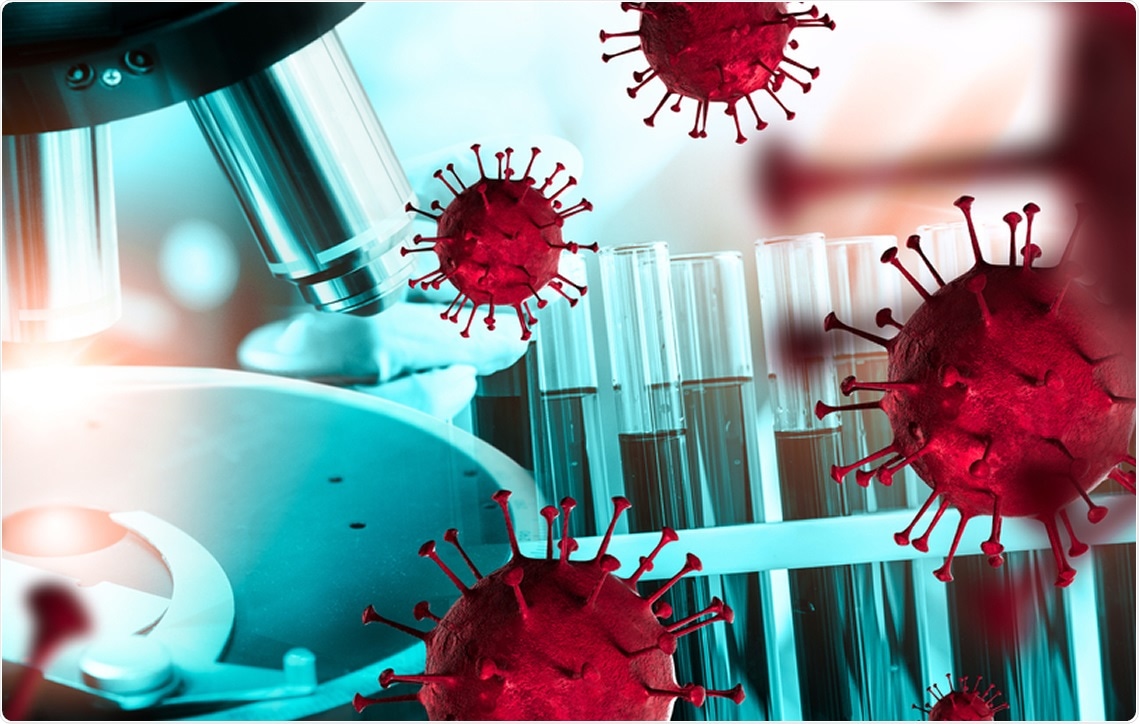A team of scientists from the United Kingdom has designed an experimental medicine trial to evaluate the safety/tolerability, and efficacy profiles of a panel of candidate repurposed therapies in coronavirus disease 2019 (COVID-19) patients. A detailed outline of the trial is currently available on the medRxiv* preprint server.

Background
Coronavirus disease 2019 (COVID-19) is a newly identified viral pneumonia caused by severe acute respiratory syndrome coronavirus 2 (SARS-CoV-2). Although about 80% of COVID-19 patients remain asymptomatic or mildly symptomatic, susceptible individuals, including older adults and those with comorbid conditions, can develop SARS-CoV-2-induced severe complications, such as pneumonia, cardiovascular and gastrointestinal abnormalities, and neurological disorders.
A significantly high level of systemic inflammation is the major cause of pulmonary damage in critically ill COVID-19 patients. Among in-hospital patients, the mortality rate remains as high as 20% throughout the pandemic. Despite the fast-paced development of potential therapeutic and prophylactic measures, there is speculation that SARS-CoV-2 will become endemic in the global population and continue to impact public health in upcoming years.
What is DEFINE?
DEFINE is an ongoing multicenter, open-level, randomized phase Ib/IIa experimental medicine trial designed to gather information about safety, pharmacokinetics, and efficacy of supplemental/repurposed treatments that are administered to COVID-19 patients receiving standard of care treatments.
Study design
The trial will recruit COVID-19 patients under three categories: 1) community patients with confirmed COVID-19; 2) hospitalized COVID-19 patients with new changes on chest x-ray or CT scan, or those requiring oxygen supplementation; and 3) hospitalized COVID-19 patients requiring assisted ventilation.
Patients belonging to these categories can be recruited for the trial depending on the experimental therapy, route of drug administration, and mechanism of action. An independent data monitoring committee has been formed to monitor the trial and ensure patient safety.
Pregnant or lactating patients and those unable to tolerate the modes of drug delivery will not be included in the trial. In addition, patients receiving therapies that cannot be reasonably suspended, such as anticoagulation therapy, antiplatelet therapy, and potassium-sparing diuretics, will be excluded from the trial. Other exclusion criteria include patients with a history of severe cardiac, renal, or hepatic disease, diabetes, or anemia.
In each experimental therapy group, a small number of patients will be randomized to experimental therapy or existing standard of care therapy depending on the disease stage at entry. Around 20 – 30 patients will be recruited under each treatment group. With the emergence of evidence, candidate therapies can be added to the protocol, and previous candidates can be removed from further investigation.
Primary objective
The trial's primary outcome is to evaluate the safety and tolerability of candidate therapies in COVID-19 patients, which will be administered as supplemental therapies to the standard of care treatment.
The safety will be assessed by daily monitoring a panel of hematological and biochemical parameters, physical examinations, electrocardiographic monitoring, and monitoring of vital signs and adverse events.
Secondary objective
The trial's secondary outcome is to evaluate the pharmacokinetics or appropriate surrogate of bioavailability of candidate therapies in COVID-19 patients. Alterations in key investigative biomarkers during the treatment period will be assessed. Any improvement or deterioration in patient condition due to candidate therapies will be constantly evaluated.
The impact of each candidate therapy on patient outcome will be evaluated by assessing oxygen-free or ventilation-free days. The ratio of the oxygen saturation to fraction of inspired oxygen concentration (SpO2/FiO2) will be monitored daily starting from day 0 up to day 15 post-therapy.
Both qualitative and quantitative assays will be performed to measure SARS-CoV-2 RNA in respiratory/saliva swab samples collected from COVID-19 patients at days 1, 3, 5, 8, 11, and 15 post-therapy.
For each treatment group, the duration of hospital stay and requirement of renal dialysis or hemofiltration will be assessed.
Follow-up investigation
To assess possible adverse events, all patients will be monitored at day 30, day 60, and day 90 post-discharge.
Ethical considerations
To avoid the risk of SARS-CoV-2 transmission, researchers will sign a consent form on behalf of the patient once verbal consent is taken. For incapacitated patients, consent will be obtained from their relatives over the phone.
The candidate therapies selected for the trial have been extensively studied in pre-clinical and clinical setups prior to the DEFINE trial. All patients will be carefully recruited for the trial to avoid unnecessary risk exposure.
*Important Notice
medRxiv publishes preliminary scientific reports that are not peer-reviewed and, therefore, should not be regarded as conclusive, guide clinical practice/health-related behavior, or treated as established information.
- Gaughan E. 2021. DEFINE: A Phase IIa Randomised Controlled Trial to Evaluate Repurposed Treatments for COVID-19. medRxiv. https://www.medrxiv.org/content/10.1101/2021.05.20.21257513v1
Posted in: Medical Research News | Disease/Infection News
Tags: Anemia, Coronavirus, Coronavirus Disease COVID-19, CT, Diabetes, Dialysis, Drug Delivery, Efficacy, Hospital, Inflammation, Medicine, Mortality, Oxygen, Pandemic, Pharmacokinetics, Pneumonia, Potassium, Public Health, Respiratory, RNA, SARS, SARS-CoV-2, Severe Acute Respiratory, Severe Acute Respiratory Syndrome, Syndrome, X-Ray

Written by
Dr. Sanchari Sinha Dutta
Dr. Sanchari Sinha Dutta is a science communicator who believes in spreading the power of science in every corner of the world. She has a Bachelor of Science (B.Sc.) degree and a Master's of Science (M.Sc.) in biology and human physiology. Following her Master's degree, Sanchari went on to study a Ph.D. in human physiology. She has authored more than 10 original research articles, all of which have been published in world renowned international journals.
Source: Read Full Article
